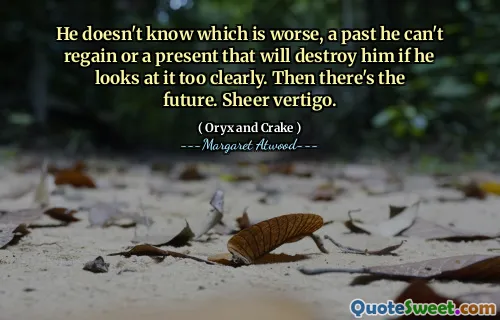{H}aving a money value was no substitute for love.
In Margaret Atwood's "Oryx and Crake," the notion that financial wealth cannot replace genuine affection is a central theme. This idea reflects the intrinsic value of love and human connection, suggesting that material possessions are inadequate substitutes for emotional fulfillment. Characters in the story often grapple with loneliness and the consequences of prioritizing profit over relationships, highlighting the deep need for meaningful interactions.
The narrative illustrates the emptiness that wealth can bring when it overshadows love, emphasizing that true happiness stems from bonds with others rather than monetary gains. As the plot unfolds, the contrast between societal values focused on capitalism and the timeless significance of love becomes increasingly clear, underscoring Atwood's message that authentic relationships are irreplaceable amidst a commodified world.






